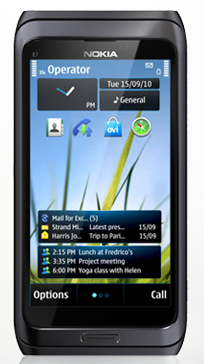Nokia's conundrum: How much pain ahead for an OS switch?

Nokia on Friday is widely expected to announce some sort of new mobile operating system strategy. At first, it appeared that Nokia was going to take the Android plunge. Then, Microsoft's Windows Phone 7 entered the picture. What all this talk misses is how Nokia will have to sit out the smartphone race to retool.

- How long will Nokia take to come out with new Windows Phone 7/Android phones?
- Who will buy a Symbian-powered Nokia smartphone in the meantime?
- Can Nokia weather the market share hit involved with mobile OS uncertainty?
Simply put, Nokia CEO Stephen Elop can have a master plan, but the execution of it will remain tricky. And according to German weekly Wirtschaftswoche, Nokia is about to retool upper management too.
Can Nokia handle a new strategy, management team and operating system? On the operating system front, the closest historical reference to what Nokia may face is Palm. As Palm's prospects weakened in the mid-2000s, the company launched Windows Mobile devices in addition to its Palm OS in 2006. In 2009, the Palm Windows Mobile experiment ended. Palm moved to create its webOS, which at least was attractive enough to get Hewlett-Packard to acquire the company.
In a blog post from 2007, Palm said:
With the launch of our first Windows Mobile product back in early 2006, it's now common knowledge that Palm has two OS platforms (Palm and WinMo). Multiple operating systems allow us to provide choice to our customers, which is important because we have such a diverse customer base. We like them both and don't play favorites...
We know how that multiple OS strategy turned out for Palm. Nokia could sing a similar tune about customer choice and multiple operating systems on Friday. What remains to be seen is whether Nokia's scale---it is much larger than Palm ever was---can make a multiple OS strategy a success.
One thing is clear: Nokia is going to kick off the Mobile World Congress, which runs Feb. 14 to Feb. 17, with some sort of bang. Analysts seem to be betting that Nokia will use Windows Phone 7.
Oppenheimer analyst Ittai Kidron said:
We still look for management to highlight a new tiered approach to its products and operating systems with the addition of Windows Phone a real possibility.
Wedbush analyst Scott Sutherland said:
While Apple and Android-based smartphones, operating systems (OS), and application stores continue to gain market share, we believe Nokia’s potential ecosystem strategy change could be a major disruption to some players in the market. Based upon Q4 data, we remain cautious on Nokia although we believe an ecosystem strategy change could change the company’s fortunes.
Sutherland also adds that Nokia could support both Android and Windows Phone 7, an idea I highlighted before.
While there has been a lot of speculation, we believe Nokia has the size and scale to support Android, Windows Phone 7 (WP7), and its own Symbian/MeeGo OS strategies. We believe the best strategy would be to put more weight behind Android, which would further isolate the RIM OS and impact smaller Android supporters.
Swedbank analyst Jari Honko added "we see Nokia to start making devices for Microsoft rather than to adopt Android OS."
No matter what Nokia decides there will be choppy waters ahead.
Jefferies analyst Peter Misek said:
We find it difficult to believe Nokia will stomach the pain necessary to adopt Android. Windows Phone 7 (WP7) will require effectively an exit for around a year as hardware and ecosystem is retooled. Windows Phone ecosystem is poor according to industry participants. Such an announcement we believe would be a boon to RIM and Apple to take share in Europe. WP7 ecosystem is too far behind and carrier support for WP7 is much weaker than any party realizes.
Will Nokia disrupt the smartphone market or be another circa 2006 Palm?
Related:
- Microsoft needs to jump start Windows Phone 7; Here are five suggestions
- Nokia: Doomed to be a zombie company?
- Android stomps Nokia’s X7 at AT&T
- Nokia and Microsoft’s Windows Phone 7: It could work, but why stop there?
- The Nokia N8; uncompromising specifications and functions in the smartphone world
- Nokia cuts workers, consolidates dev platforms, posts profit
- Nokia: Can it afford to avoid Android much longer?
- Can a Microsoft man fix Nokia? Here are 6 things that have to happen